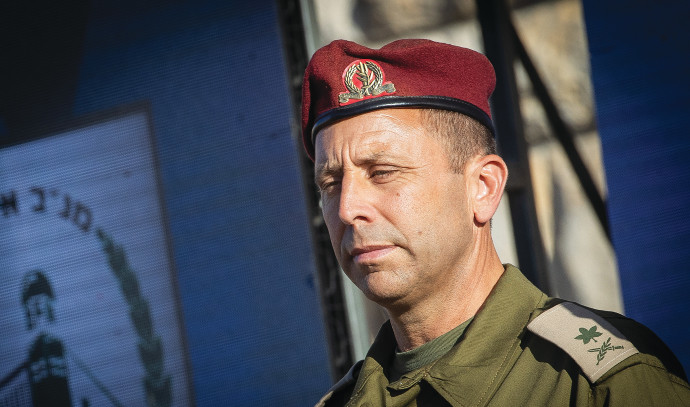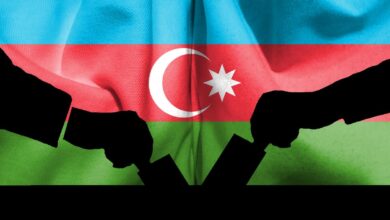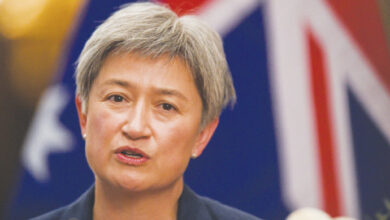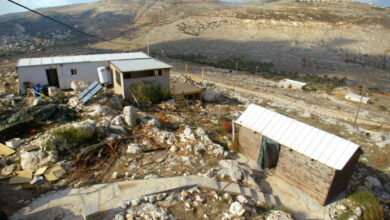Maj.-Gen. Avi Bluth attempts to restore order in West Bank

No one in Israel talks much about the West Bank, given the focus on Gaza, next Hezbollah, and these days even Yemen, but the world, including the US and the top international courts, is very focused on the near constant violence there.
Many globally have described the area as one of chaos and rampant war crimes by Israel against the Palestinians, with the US now imposing rounds of sanctions against extremist Israelis there with clouds of violent activities hanging over their records, and possible severe negative impacts on the way from international courts. Meanwhile, on the Israeli side, the clear narrative has been focused on intensified raids to prevent a spike in Palestinian terrorism which dates back to March 2022.
On July 8, Maj.-Gen. Avi Bluth replaced Maj.-Gen. Yehuda Fuchs as OC Central Command, including responsibility for the West Bank.
Fuchs was given high compliments by IDF Chief of Staff Lt.-Gen. Herzi Halevi and is thought of within the defense establishment as a serious and sophisticated general.
But he himself lamented in the command changeover ceremony not only how much Palestinian terrorism still thrives, but that he had often failed to protect Palestinians from extremist Jewish violence.
Can Bluth succeed in restoring order where Fuchs himself did not believe he succeeded, despite his best efforts?
At the July 8 ceremony, Fuchs told the crowd, “To my great disappointment… (Jewish) nationalist crime has reared its head, and under the guise of war and the desire for revenge, it has sown chaos and fear among” innocent Palestinians.
He went on to warn that the local religious-Zionist leadership “is discouraged and does not find the strength to come out openly and act according to the Jewish values that they are educating their children on,” criticizing extremist Jewish violence against West Bank Palestinians.
Fuchs continued, “This is not Judaism to me…. This is not the way of the Torah. It is about adopting the enemy’s tactics and copying his rules. It was my responsibility to act. And here, too, unfortunately, I didn’t always succeed.”
Bizarrely, there are Israelis on the Right who view Fuchs as soft on terrorism.
Yet Fuchs, since Hamas’s October 7 invasion, radically altered the entire picture, and the IDF has arrested over 4,200 Palestinians across the West Bank, including more than 1,750 affiliated with Hamas. Many of those arrested have been placed in administrative detention, breaking records for even the Second Intifada and reaching numbers only seen during the First Intifada of 1987-1991.
For a reference point prior to October 7, consider that the IDF made a point of bragging in July 2023 when it spent a few days arresting around 120 Palestinians in Jenin. Minuscule compared to the current numbers.
Under Fuchs, the IDF has also undertaken significant airstrikes in the West Bank, 57 in number, something that had not happened between 2006 and 2023.
In addition, according to the Palestinian Authority Health Ministry, more than 560 West Bank Palestinians have been killed since October 7.
Regardless of debates about the exact numbers, the IDF has said that the vast majority of them were gunmen killed during raids or terrorists carrying out attacks. But there are easily double digits of cases that have been raised as unjustified settler violence or mistaken or improper killings by IDF soldiers, something that top defense officials do not deny in private and which Fuchs pretty much confirmed in his outgoing speech.
These double-digit killings, along with a huge spike in other extremist violent Jewish actions against Palestinians, almost none of which are prosecuted, have put Israel in serious jeopardy globally in general, and once again more specifically with the US, the International Court of Justice, and the International Criminal Court.
Top Israeli defense officials have acknowledged to The Jerusalem Post that the IDF does not have a handle on the issue.
In February 2023, Halevi publicly apologized that the IDF had failed to stop dozens of extremist settlers from a mass arson of parts of the Palestinian town of Huwara – a place where multiple Israelis had been killed, but where the extremist settlers had burned property without distinction between violent or innocent Palestinians. At the same time, top IDF officials suggest that the real problem lies with the Israel Police failing to probe Jewish extremist crimes against Palestinians.
Reports from both Channel 12 and The New York Times have disclosed internal letters from Fuchs to Halevi warning that the police are utterly failing to do their job.
Despite all of the intense efforts and basically daily or nightly raids often in multiple Palestinian areas at the same time, the IDF has not restored order and a sense of safety in the West Bank for Jews either.
During this same time frame, around 27 Israelis, including security personnel, have been killed in terrorist attacks or clashes in Israel and the West Bank. There have also been countless numbers of lower-grade Palestinian rock-throwing attacks on Jews, often so numerous that few bother to keep track.
Recently, a senior IDF officer expressed significant doubt about whether the violence that started in March 2022, long before October 7, would be put down even if a ceasefire were reached with Hamas in Gaza, and Hezbollah in Lebanon.
Rather, top Israeli defense officials are worried that Iran and Hamas will continue to use the West Bank to pose terrorist and destabilization threats to Israel for quite some time.
DOES BLUTH have a chance of getting this all under control?
Some things are beyond anyone in the IDF’s ability to lower Palestinians terrorism and relate to the diplomatic scene or what will happen when PA President Mahmoud Abbas finally dies, given his old age. But within what the IDF can do, the Post has learned that Bluth was one of the forces who helped push through the nightly raids of Operation Break the Wave as well as the large July 2023 Jenin operation in order to push back on the March 2022 waves of terrorism.
Furthermore, the Post has learned that Bluth will push harder than ever to intercept terrorism funds and dual-use terrorist physical materials.
Regarding Jewish extremist violence against Palestinians, if you take your cue from a Times piece in May, the answer would be an emphatic “no.”
The article portrays Bluth as a partisan who was already in bed with the settler movement’s goals of slowly taking over Palestinian lands in his prior role as one of Fuchs’s top deputies commanding IDF forces in the West Bank.
It says that Bluth distributed a video to IDF soldiers serving under him promoting the military support of settlements that are illegal even under Israeli law, and that Bluth defended a movement of “farms” which are used as a low-grade way to take over Palestinian land, saying that the farms were legal and offering a tour to the authors of the article.
According to the article, the IDF Spokesperson’s Office later retracted Bluth’s defense, recognized that the farms were illegal, and flagged that the video would no longer be distributed within the IDF.
Bluth’s voice is never directly heard in the article, but the Post has learned that, in his view, the error was more of a technical one of not catching on, in a very convoluted and open-ended question, to situations where Jews build on Israeli government land with approval versus without approval – but was in no way an endorsement by him to build on Palestinian land.
Further, the Post is very familiar with Bluth, as it is with various other top generals, both from closed military reporter briefings and other interactions.
There is no question that Bluth is not a left-winger.
He is a religious Zionist, lived significant parts of his childhood in Neveh Tzuf, and attended the Eli Yeshiva, both in the West Bank, and served comfortably as Prime Minister Benjamin Netanyahu’s personal military adviser from 2018 to 2021.
But Bluth is a much more complex figure than he is presented in the Times caricature.
He is a feminist of sorts, married to a woman who is breaking barriers for Orthodox Jewish women’s education.
Just as many West Bank Jewish settlers vociferously attacked Fuchs, Bluth stridently defended Fuchs, including after he heard Fuchs’s fiery speech tearing into portions of silence from the very religious Zionist community from which Bluth comes.
Despite serving with Netanyahu for three years, he was kept on a forward military track by former IDF chief of staff Aviv Kohavi and current IDF Chief of Staff Halevi, both of whom clashed with Netanyahu at times. Apparently, they both believed Bluth was committed to the IDF’s values and the rule of law more than he might be to any settler ideology, regardless of whatever his private views might be.
In his first two weeks in office, Bluth has already signed three administrative orders restricting the movements of Jews within the West Bank, including making one of the orders even stricter than it had been under Fuchs.
The Post has also learned that he ordered the eviction of a small illegal outpost last week.
Bluth’s dedication to the IDF
All indications are that Bluth is committed to the uniform first – a lifelong soldier – with everything else coming second. As long as the IDF as a whole, at least in principle, is committed to cracking down on Jewish extremist violence against Palestinians, he is, too. Regardless, when he signs administrative orders, they usually come from the Shin Bet (Israel Security Agency), partners whom, the Post understands, he trusts deeply.
In fact, in his inaugural speech on July 8, he addressed maintaining order, saying, “We will not blink on the issue, and will do what is good and right for the State of Israel. We will win and remain human, and we will show zero tolerance toward manifestations of violence of any kind.”
Interestingly enough, while his speech clearly implies that he will crack down on Jewish extremist violence as well as Palestinian violence, he does not explicitly make reference to the Palestinians’ safety as a group.
This is a large contrast to Fuchs’s outgoing speech. But it is not as large a contrast compared to Fuchs’s incoming speech in 2021 or to the outgoing speech of Maj.-Gen. Tamir Yadai in 2021.
Fuchs did not explicitly use the word “Palestinians” and did not proactively criticize Jewish extremists in his inaugural speech, instead making a vague reference to his obligation to protect “the residents of the area” – an IDF code phrase which includes the Palestinians.
Yadai was a little bit more explicit, saying his role had been to “improve the quality of life for the two populations,” a more obvious reference to the Palestinians.
In that light, it could just be that outgoing commanders are ready to take greater liberties in acknowledging the Palestinians than incoming commanders, whose biggest concern coming into office may be to establish trust with Jewish settlers (Israeli citizens), whose safety is their primary duty.
In that sense, the contrast between Fuchs’s and Bluth’s speeches may not be as large as it appeared, and the main important point may be that Bluth did commit to preventing violence of all kinds.
But a big part of the picture is still somewhat missing here.
On July 22, the High Court of Justice held a follow-up hearing about whether the police and other law enforcement systems in Israel have failed to protect Palestinians at the Khirbet Zanuta village near Hebron.
This was one example of many which Fuchs and other Israeli defense officials have warned of, pointing the finger at the police – but in a larger sense at National Security Minister Itamar Ben-Gvir and Finance Minister, with some Defense Ministry powers, Bezalel Smotrich – as having allowed extremist Jews to run rampant recently against Palestinians in terms of violence and in terms of seizing land.
It is unclear how the High Court will rule, though the justices were testy with Israeli government and IDF officials about the failure to protect Palestinians and their land in a prior hearing months ago. But even if the High Court orders specific protections and enforcement measures in that case, can the judiciary really keep up with government ministers and an ever evolving hazy series of problems in the West Bank?
If Fuchs did not succeed in reining in the problem, while Bluth may not be the ideological settler activist that the Times portrayed him as, it is also not clear how Bluth would succeed more than Fuchs.
Crucially, he also may face far greater pressures than Fuchs to go easy on extremist Jewish settlers, because the criticism he will face will hit much closer to home.
Undoubtedly, Fuchs, and Maj.-Gen. Nitzan Alon before him, and other Central Command heads before them, were very disturbed to be so hated by many of the Jewish settlers who were part of the larger group they were risking their lives to protect.
But Fuchs could leave “work” and go to his family and friends who were not connected to the West Bank situation. In contrast, if and when Jewish settlers start to turn on Bluth, he may not be able to escape criticism in his local synagogue, and it may affect his children and family.
Bluth has support from personal contacts in Efrat, Beit El, and elsewhere, but some right-wing circles are already trying to brand Bluth as “Fuchs 2” in a clearly pejorative sense.
How Bluth will hold up under these more intense pressures over time is a crucial issue.
Also, in Fuchs’s outgoing speech, he spoke passionately about the importance of a strong PA as a partner to combat Palestinian terrorism.
Smotrich and Ben-Gvir have made one of their greatest missions trying to humiliate and even topple the PA. Mostly, the Shin Bet, the IDF Civil Administration chief, and the IDF chief set policy with the PA, but if Bluth is under pressure from Smotrich and Ben-Gvir, might he feel the pressure more acutely than Fuchs did?
Only time will tell.





